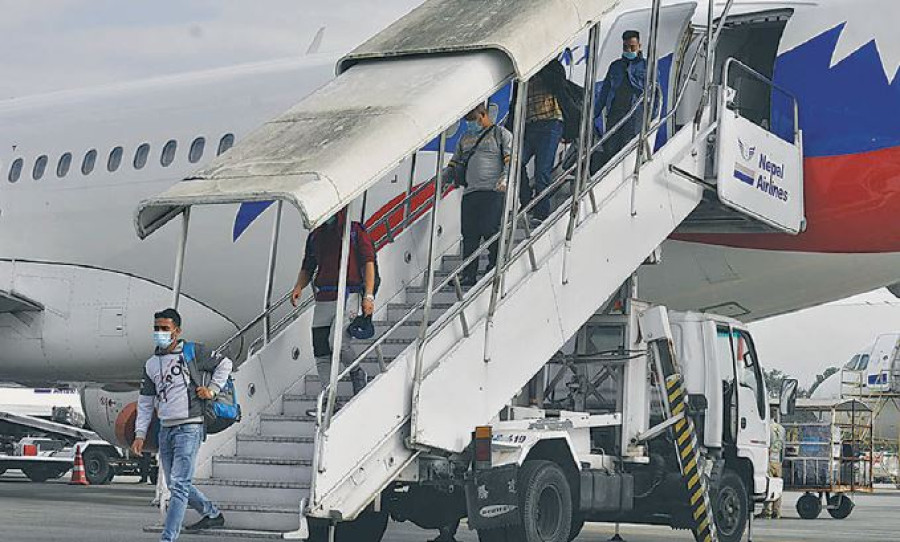National
Government plan to repatriate only 500 migrant workers a day comes under fire
There are hundreds of thousands wanting to return home and this number is growing with the expiry of more visas.
Chandan Kumar Mandal
No one knows exactly how many Nepali migrant workers are awaiting repatriation. Estimates vary.
The Foreign Employment Board in May had said that 127,000 Nepali migrant workers were expected to return home immediately while another 407,000 are expected to return in the long run due to the effects of the Covid-19 pandemic.
The Ministry of Foreign Affairs’ initial estimate was nearly 227,000 workers who should be brought home urgently, and 377,000 would return later. Another estimate by foreign employment recruiting agencies said at least 500,000 Nepali migrants would return home soon.
With no commercial flights operating in the country since March 22, migrant labourers have been returning on chartered flights. This began on June 14.
According to government statistics, as of Friday 50,662 Nepalis have returned home from 30 different countries on repatriation flights. This includes not only migrant workers but also students and others who had been stuck abroad after Nepal closed its skies to commercial flights.
When repatriation began in June, nearly 1,000 to 1,500 Nepalis, mainly from the Gulf and Malaysia, had been returning every day. There were several chartered flights a day to bring migrant workers home.
But with the Cabinet decision on Monday to allow no more than 500 people to return every day, the number has been going down. On Tuesday 299 returned, on Wednesday 283, on Thursday 148 and 471 arrived on Friday.
The government’s decision would mean that it will be a long time until the migrant workers waiting to return will be able to finally see their families.
Bikash Khatri, 30, is one of them.
“I and my seven Nepali friends have been without a job for months now. Visas of six of them have already expired,” said Khatri, who has been working in a restaurant in Kepong, a town in northern Kuala Lumpur. “When we approached the Nepali Embassy, they asked us to contact travel agencies for tickets. We were told flights are already full till August 21.”
The government has meanwhile closed the Nepali skies to regular flights until August 31.
With the daily quota of 500—300 of them on the recommendations by Nepali missions abroad and 200 under the Foreign Employment Welfare Fund repatriation programme which covers their airfare, it is not clear how long Khatri and his friends will have to wait.
According to Barun Ghimire, a human rights lawyer and programme manager at the Law and Policy Forum for Social Justice, an organisation that works on migrant rights issues, the decision shows the government carries no sense of urgency towards destitute and stranded migrant workers.
“Initially, the government failed to maintain the transparency in the repatriation process and prioritise on who needs to return home first, so the whole process has been ineffective and delayed,” Ghimire told the Post.
“Now, the decision to only bring 500 workers every day is concerning also because the government has not even given a satisfactory reason behind doing so.”
A National Human Rights Commission, Nepal report released on Thursday also pointed out that delay in repatriating workers will only increase the number of workers requiring repatriation.
Analysing the data of labour permits, the rights body’s report estimated that nearly 172,500 works permits have expired in the 115 days between the suspension of international flights and July 15. Every day, 1,500 more work permits will be invalid and need repatriation, according to the report.
Now, the government decision to further cut down the number of Nepalis to be brought home has left migrants rights activists perplexed.
“Even if only 100,000 want to come home immediately, it will take a long time to bring them home. They should have been allowed to return immediately but they are just waiting to come back home,” said Swarna Kumar Jha, a labour migration researcher.
According to Jha, who is also a coordinator for the National Network for Safe Migration, a group of organisations working in the migrant rights sector, the government’s decision is an attempt to hide their failure to contain the spread of Covid-19 in the country as bringing more workers will mean extra pressure on it.
When the Supreme Court asked the government to bring home stranded Nepali workers using the welfare fund, it had also asked the government to start their repatriation at the earliest. But it took nearly a month for the government to finalise the guidelines.
Meanwhile, the directive brought to arrange airfare for those who cannot afford is burdened with a complex and time-consuming process for verification of workers’ status, which is feared to further delay their repatriation.
“There are no commercial flights. Nor has the government allowed employers who want to arrange chartered flights to send back their workers,” said Ghimire.
“Such delays mean multiple problems for workers. But the government is acting as if it is doing these workers a favour. They are asking for their rights under the state’s legal obligations.”
Nepal’s foreign missions, dealing with a rising number of Nepalis willing to return home on limited chartered flights, agree that regular flights would have accelerated the whole repatriation process.
According to Jha, delays in bringing workers home only worsen their conditions in labour destinations and add up psychological burden on them.
“I have spent my savings and my family wants me to return,” said Khatri, originally from Dolakha. “I will return empty-handed but I don’t know when that will be with the government taking back only 500 a day. And there are thousands like me in several countries waiting for their turn.”




 18.12°C Kathmandu
18.12°C Kathmandu














